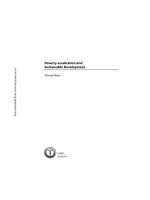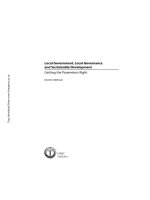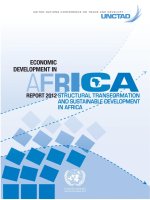REDD+ Poverty Reduction and Sustainable Development
Bạn đang xem bản rút gọn của tài liệu. Xem và tải ngay bản đầy đủ của tài liệu tại đây (415.79 KB, 2 trang )
Partners
REDD +
Contact
Poverty Reduction and
Sustainable Development
International Institute for
Environment and Development
(IIED, the UK)
University of Life Sciences
(Aas, Norway)
Fundação Amazonas
Sustentável (Brazil)
Hamilton Resources (Ghana)
Sokoine University of
Agriculture, Faculty of Forestry
and Nature Conservation
(Tanzania)
Makerere University, Faculty of
Forestry and Nature
Conservation (Uganda)
SNV actively seeks other partners
and potential donors to help
collaborate on this project. For more
information, please contact:
Adrian Enright,
Project Manager, at
Pilot
site
To find out more about the project visit:
/>
Pilot Project
in Vietnam
Reducing emissions from
deforestation and forest
degradation (REDD+) is a
major focal point of
international efforts to
address climate change.
Vietnam was selected as a
project site because it has
already implemented policies
and programmes to reduce
deforestation or increase forest
cover, including new policies
that have introduced payments
for ecosystem services.
This three year project, funded by the
Norwegian Agency for Development
Cooperation (Norad), is looking into how the
different options for REDD+ design and policy
at international, national and sub-national
levels will help achieve more effective
greenhouse gas emission reductions in
conjunction with sustainable development
and poverty reduction.
Exploring options
SNV is the leading partner for
Vietnam and is working
alongside project partners at
the REDD+ project site in Cat
Tien to investigate different
options for REDD+ and to
evaluate their effects on poverty
goals and emission reductions.
The project is working with selected REDD+ pilot
projects across five countries: Vietnam, Brazil,
Tanzania, Uganda and Ghana. Each country will
generate evidence and improve understanding
of: the impact on poverty of REDD+ pilot activities;
the relative merits of different types of payment
mechanisms; and the transaction costs of REDD+.
This will include looking at the
internal distribution and
allocation of REDD+ payments
under different scenarios, with
an emphasis on understanding
the extent to which pro-poor
approaches to REDD+ payment
systems can be cost-effective.
Opportunity costs & BDS
SNV is also leading the development of a
framework to assess the opportunity cost of
REDD+ projects, with the aim of scaling up this
work to develop national cost curves for
REDD+. This work will build on existing decision
making tools to facilitate future investment into
pro-poor REDD+ projects within Vietnam and
internationally. SNV is also exploring options for
appropriate Benefit Distribution Systems (BDS)
for REDD+ by working alongside communities
and local authorities to determine the most
effective and efficient ways of distributing
REDD+ payments.
Poor forest > Rubber
1,000
100
Medium forest > Shifting cultvation
10
Changes in NPV/C - stock ($/Mg CO2)
Project Overview
11
1
0.1
0.01
0.001
0
-0.001
-0.01
-0.1
-1
-10
Poor forest > Bare land
-100
Poor forest > Shifting cultvation
Medium forest > Bare land
0
700,000 1,400,000 2,100,000 2,800,000 3,500,000 4,200,000 4,900,000 5,600,000 6,300,000 7,000,000
Carbon Stock Changes (Mg CO2 - eq/ha.year)
Opportunity cost estimate for REDD+ pilot area, Vietnam









